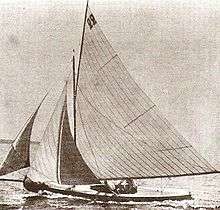Ton class
Ton classes are categories used to identify classes of yachts.
Thames tonnage
Early attempts at creating rating rules were based on the British "old tonnage measurement" system to calculate the volume of the hold of large commercial ships. It gave the vessel's carrying capacity in tons (at 35 cubic feet per ton) or, as some believe, in tuns. Sail area was not included, of course, nor were any credits given for less efficient rigs so, naturally, in the yacht-racing field the cutters predominated. Eventually, this rule was modified in 1854 as the Thames Measurement Rule:
where the length is in feet, from the stempost to sternpost; and the beam is the maximum beam, in feet.
Godinet rule


The Godinet rule was adopted in 1892 by the "Union des yachts français", and was quickly adopted by other nations from the European continental. It allowed the classifications of yachts by tons, with a formula established by Auguste Godinet which considers displacement, length, and the total sail area.
where:
- L = LWL
- P = girth of the hull
- S = Sail area
- T = Rule in tons
The Société Nautique de Genève, which was an early adopter of the rule, amended it in 1901 to include the skin girth instead of the chain girth.
This new French rule was adopted in December 1892 by Switzerland followed by Germany, Denmark, Finland and Sweden in March 1893. Belgium and Spain completed the list. In March 1894 the Godinet rule is first noted in the United States, at the construction of the Vendenesse, the world's first aluminium yacht.
Some yacht in existence that were designed to the Godinet rule:
- Bona Fide: designed by Charles Sibbick in 1898 to rate as a 5-tonner. It was built at the Albert Yard, Cowes, for J.Howard Taylor, who laterwon the Gold medal in the category 3 to 10 tons at the 1900 Olympics. This yacht was authentically restored between 1999 and 2003 by the Cantiere Navale dell'Argentario, in Tuscany and is the last 19th century Godinet rater.
- Calypso: designed and built in 1911 to rate as a 3-tonner
Olympic Games
The Ton classes where Olympic classes 1900 and probably also on that of 1896. Unfortunately due to weather conditions the yacht races in 1896 where cancelled and much information of that event is not longer available. For the 1900 events, sailing categories are established based on the Godinet rule:
- 0.5 Ton
- 0.5 – 1 Ton
- 1 - 2 Ton
- 2 - 3 Ton
- 3 - 10 Ton
- 10 – 20 Ton
- Open Class
1900 Olympics  France
France
- the 3-tonner Phoebus II
- aboard a 3-tonner
See also
References
- ISBN 978-90-78440-23-9